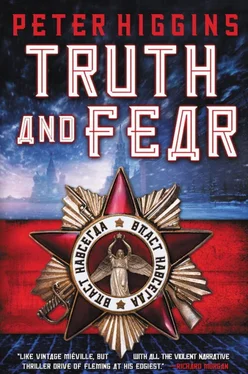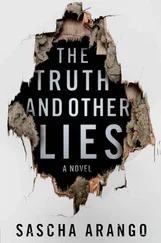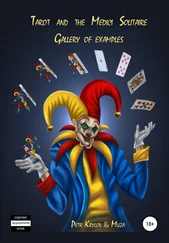The substance dug from the bodies of the immense dead angels varied in consistency. Some of it was as dense as lead and as hard as rock, but it could be soft and fibrous, like meat, or a viscous semi-liquid, or a fine and weightless lustrous diaphane. It ranged in colour from heavy blood-purples, almost blacks, through reds to alabaster orange-pinks. The theoreticians of the Vlast had no idea how the angels’ living bodies might have functioned: there were no apparent internal organs, and no two carcases had the same shape or inner structure.
Unlike the Armoury engineers, Chazia didn’t wear protective clothing. She didn’t work from behind thick glass, her hands in clumsy rubber mittens. She didn’t mask her face with gauze. Unafraid, she immersed herself in angel stuff and breathed its dust. She tasted it. She let it stain and merge with her flesh. Absorbing and being absorbed. It was strength, it was vigour, it was a heady prospect of joy. There had been failures, of course, false starts and disappointments and near-disasters. No one had ever attempted anything so ambitious as this work of hers. No one had dared imagine it or face the risks. But she had driven herself onward relentlessly. And in the end she had succeeded.
She had made herself a suit of angel flesh to wear.
And now, in the grey subaqueous wash of light, she pulled the oilcloth shroud from it.
The thing she had made looked like a mudjhik, but smaller and slighter. A matte reddish-purple carapace of interlocking pieces. And a mudjhik would have had the brain and spinal cord of an animal embedded in it, to give it cerebration, whereas this had none: it required none. She had made an angel headpiece to encase her own head, and angel gauntlets for her hands.
She stared at it, trembling with excitement. Its crude face stared into hers. The sense of power and life in it prickled across her skin, raising the hairs on the back of her neck. She felt the tightening in her throat. The stirring in her belly and between her legs. For weeks she had come down here daily to look at it. To be with it. To stand before it. She had not yet dared to put it on. Fear, or the delicious prolongation of desire, had held her at the brink. The tipping point.
She knew the risks. The science of angel flesh was a thin crust of bluster over vertiginous ignorance. Many had ruined their minds and died. She was not reckless. She would proceed cautiously and step by step. But she had already delayed too long.
No more delay. She must begin.
In the first second and a half of the attack on the truck the SV men reacted slowly. They needed time to readjust. Lom was faster. He slid forward on the bench and kicked at the lieutenant’s right hand. The Blok 15 went spinning from his grip and clattered to the floor. Lom punched him in the face. Hard. He went down.
The captain hesitated, caught between the unknown threat outside and what was happening inside the truck. Then he was swinging his gun towards Lom, and Lom was scrabbling towards him, knowing he had no time, knowing he had failed and it was over, when Maroussia grabbed the captain’s wrist and forced it down. The revolver went off, firing into the floor of the truck. The shot was deafening in the enclosed space. The smell of burned powder. Lom clubbed the captain with his fist in the side of the head and he fell sideways.
The tailgate crashed open. A face looked in. A long, oval, serious face under an astrakhan hat. Round wire-rimmed glasses. A doctor’s face. A poet’s.
‘You!’ said Lom.
‘Come with me, please,’ said Antoninu Florian. ‘There is little time to lose. A gunshot will attract attention.’
Maroussia stared at him.
‘Who—’ she began.
‘Please,’ said Florian. ‘Please hurry.’
Maroussia looked at Lom. He nodded. Get through the next two minutes. Maroussia grabbed her carpet bag and climbed down from the back of the truck, clutching it tight in her hand. Lom picked up the lieutenant’s gun from the floor at this feet. Checked the magazine. It was full. He followed Maroussia out of the truck and into the street.
It was snowing hard. Lom spun round, checking on all sides. No visible immediate threat. People on the pavement were looking. One man in particular, bareheaded, open shirt, was staring hard. Considering getting involved but hadn’t made his mind up yet. Florian was already pushing his way through the gathering crowd, moving fast.
‘Go!’ Lom hissed in Maroussia’s ear. ‘Go!’
They followed Florian until he ducked through an arched brick entrance leading into shadow. At the corner by the entrance was a bakery. A torn awning. Curlicues of white script. BAKERY. GALINA TROPINA. PASTRY. COFF-- . The archway opened into a long gully between high buildings. It was at least two hundred yards long, and deserted. There was no sign of Florian.
‘Do you know this place?’ he said to Maroussia. ‘Do you know where it goes?’
‘It leads to the back entrance to the Apraksin,’ said Maroussia. ‘The indoor market. There’ll be crowds.’
‘OK,’ said Lom. ‘Let’s go.’
They were about fifty yards into the gully when Lom felt the un-mistakeable zip of a bullet passing close to his ear. There was a sharp crack behind them. The echo followed. Lom swung round, pulling the Blok 15 from his pocket. The SV captain was silhouetted just inside the entrance, lining up for a better shot.
‘Hey! You! Captain!’
The shout came from somewhere up above them.
Antoninu Florian jumped from the high window ledge and landed with a heavy skid between them and the SV captain, crouching like an animal. He rose and charged with astonishing, loping speed. But there was too much ground to cover and not enough time.
The captain shot him in the belly.
Florian spun round with the force of the bullet hitting him. His knees went first. He staggered and collapsed almost at their feet in a hunched foetal curl, his hand at his stomach. Dark blood spilling out between his fingers and pooling on the ground.
‘Oh,’ said Maroussia quietly. ‘Oh.’
The SV captain raised his gun again, straight-armed for a careful aim. They had no cover. Nowhere to go. Lom shot him. The captain’s skull burst open in a spray of blood and fragments of bone. His lifeless body smashed back against the wall and toppled sideways to the ground.
There was a moment of stillness. Silence. Lom didn’t move. Nor did Maroussia. They were watching Florian. He was getting unsteadily to his feet. Maroussia ran forward. Lom followed. By the time they reached Florian he was standing, swaying, head bowed and holding his hands cupped together at waist level as if he was inspecting the sticky mess on the front of his coat. The thick spill of blood. Then he looked up at them, his eyes unfocused. Glassy surprise.
‘Shot, then,’ he said, almost to himself. ‘Shot again.’
His legs gave under him and he would have fallen if Maroussia hadn’t caught him. He managed to get himself upright again.
‘Sorry,’ he said. ‘Sorry. Blood. On your coat now.’
‘Can you walk?’ said Maroussia.
‘Honestly don’t know. Let’s give it a try.’
Lom put his shoulder under Florian’s arm and lifted him, getting the weight off his feet, drag-carrying him along. His face against Lom’s cheek felt cold and damp. His lungs were dragging at short, fast, shallow breaths.
‘We have to get out of here,’ said Lom.
Stumbling awkwardly, they retreated down the long alley towards the Apraksin, the injured man a sagging, limping weight on Lom’s shoulder. As they got near the far end, Florian tried to pull away from Lom. He seemed to have recovered some strength, enough to stand unaided, though blood was dripping down the front of his coat and splashing the ground at his feet.
Читать дальше


![Кэмерон Доки - Правда и ее последствия[Truth and Consequences]](/books/79610/kemeron-doki-pravda-i-ee-posledstviya-truth-and-con-thumb.webp)









